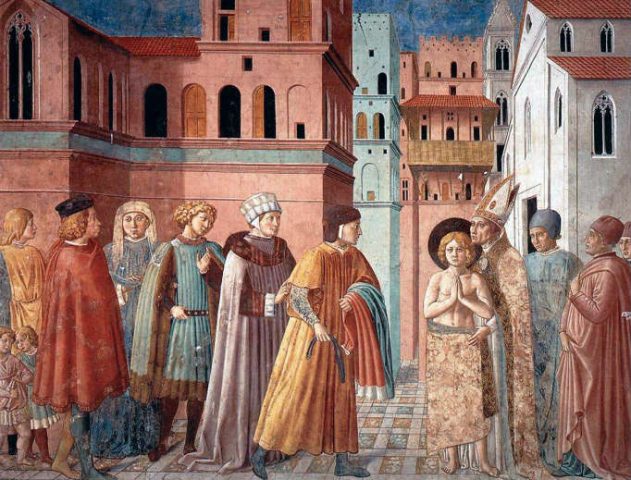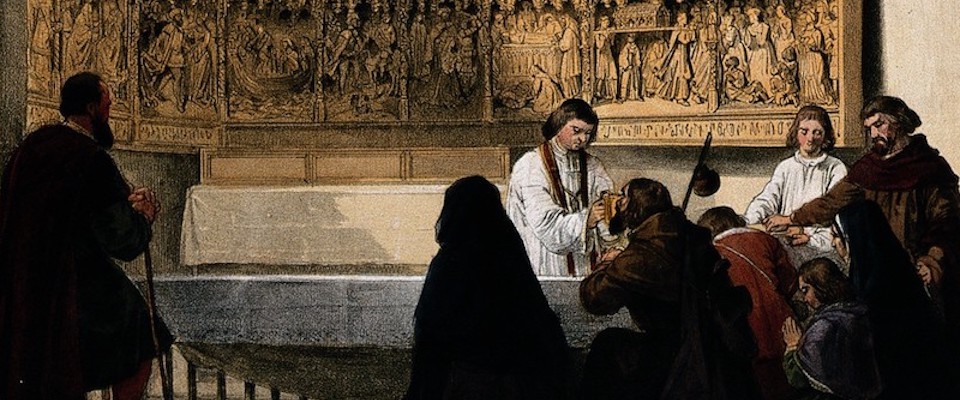Loving Your Enemies, Hating Your Family (Or Country), by Steven D. Greydanus

A Tale of Two Jesuit High Schools, by Max Bindernagel
July 1, 2019
A Handful of Heretics in The Early Church, by David Torkington
July 1, 2019
Benozzo Gozzoli, Scenes from the Life of St. Francis 3: Renunciation of Worldly Goods (1452, fresco, monastery church of St. Francis, Montefalco, Perugia, Italy)
Homily for the 13th Sunday in Ordinary Time
By Steven D. Greydanus, National Catholic Register, 6/30/19
Yesterday Suzanne and I went to a funeral. Friends of ours buried their father, and among his children was a priest who celebrated the beautiful funeral Mass.
To bury the dead is one of the seven corporal works of mercy, and to bury one’s parents is also an act of filial piety, of the honor or reverence that we owe to our parents under the fourth commandment.
To care for our aging parents, and to bury them at death, are among the most necessary duties that we owe to our parents — and, if anything, this duty was even more deeply felt in Jesus’ day than in ours.
Jesus took very seriously the obligation to provide for one’s aging parents. This is what he blasted the Pharisees for not doing.
Loving Your Enemies, Hating Your Family
All of which heightens the shock of one of the most distressing things Jesus ever said, in today’s Gospel.
So your father is dead and you want to bury him first and then follow me? Leave those who are dead to bury their own dead.
You’ll follow me after saying goodbye to your family? No one who puts their hand to the plow, to work in the Lord’s field, and looks back to what was left behind is fit for the kingdom of God.
Do those words sting? If they don’t, we’re not listening!
Our Lord says so many things that we find comforting and reassuring.
Come to me, all who labor and are heavy laden, and I will give you rest. Take my yoke upon you, and learn from me; for I am gentle and lowly in heart, and you will find rest for your souls. For my yoke is easy, and my burden is light.
Such beautiful, hopeful, encouraging words from Matthew’s Gospel!
Love your enemies, do good to those who hate you, bless those who curse you, pray for those who abuse you. To him who strikes you on the cheek, offer the other also; and from him who takes away your coat do not withhold even your shirt.
These are difficult words, but exalted. Even if we feel very far from living up to those words, if we see other people living them out, if we hear stories about heroic forgiveness or generosity to enemies, it’s inspiring. It makes us want to be more virtuous ourselves.
But what Jesus says today in Luke’s Gospel doesn’t seem beautiful or exalted. It seems outrageous. Leave the dead to bury their own dead?
Jesus’ Hard Words About Family Ties
The fact is, Jesus often seems to downplay family ties, including filial piety. Later in Luke’s Gospel he says:
If any one comes to me and does not hate his own father and mother and wife and children and brothers and sisters, yes, and even his own life, he cannot be my disciple.
Love your enemies but hate your parents and your family! Love your neighbor as yourself, but hate your own life! What a religion! “What great violence is necessary,” says St. Augustine,
in order that a man may love his enemies, and hate his father, and mother, and wife, and children, and brothers! For He commands both things who calls us to the kingdom of heaven.
G.K. Chesterton once quipped that “The Bible tells us to love our neighbors, and also to love our enemies; probably because generally they are the same people.”
Jesus goes a step further: Love your enemies, but be prepared to hate your family members, because if you follow me, your family members may be your enemies! From Matthew’s Gospel:
Brother will deliver up brother to death, and the father his child, and children will rise against parents and have them put to death…
I have not come to bring peace, but a sword. For I have come to set a man against his father, and a daughter against her mother, and a daughter-in-law against her mother-in-law; and a man’s foes will be those of his own household.
He who loves father or mother more than me is not worthy of me; and he who loves son or daughter more than me is not worthy of me.
Notice that instead of hating parents and family, here Jesus says we must not love them more than we love him. This, of course, is what it means to “hate” our parents and family: We must not love them more than we love Jesus.
But this isn’t a matter of feelings, this love and this “hatred.” It’s about actions. Jesus is warning his disciples that following him may mean turning their backs on their own family, who may reject them, expel them from synagogues, bring them before authorities, deliver them up to persecution and even death.
What do you do when your family members force you to choose between them and following Jesus? Many saints have had to make that call. Take St. Perpetua, whose father wanted her to renounce her faith. She refused and was imprisoned and eventually martyred.
Francis of Assisi was brought before the bishop by his outraged father. St. Clare was also opposed by her father. Thomas Aquinas’s family was so opposed to his religious vocation that they hired a prostitute to seduce him.
Are we prepared to turn our backs on our families if it came down to it?
The True Family of Jesus and the Human Family
If we are, Jesus promises us a new family, not just in heaven, but here on earth.
Truly, I say to you, there is no one who has left house or brothers or sisters or mother or father or children or lands, for my sake and for the gospel, who will not receive a hundredfold now in this time, houses and brothers and sisters and mothers and children and lands, with persecutions, and in the age to come eternal life.




